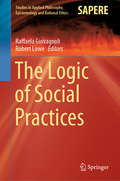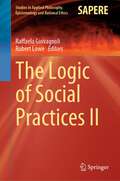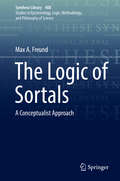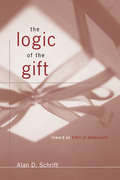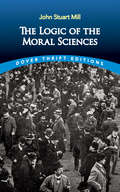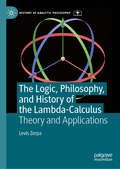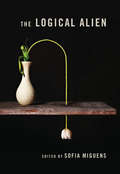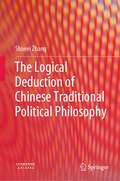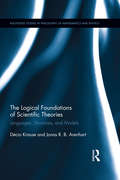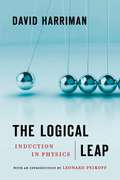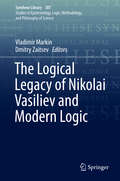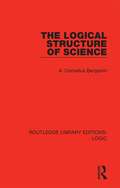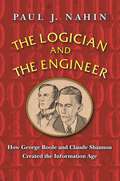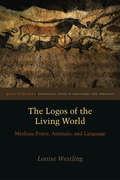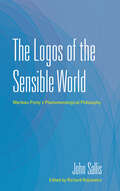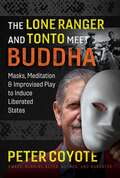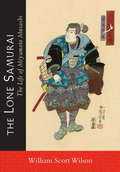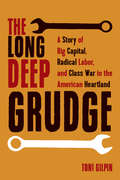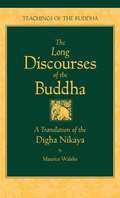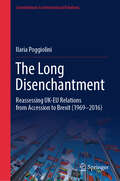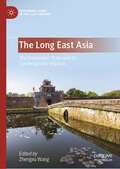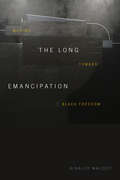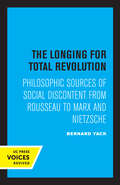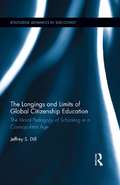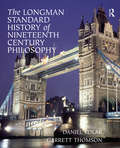- Table View
- List View
The Logic of Social Practices (Studies in Applied Philosophy, Epistemology and Rational Ethics #52)
by Raffaela Giovagnoli Robert LoweThis book reports on cutting-edge research concerning social practices. Merging perspectives from various disciplines, including philosophy, biology, and cognitive science, it discusses theoretical aspects of social behavior along with models to investigate them, and also presents key case studies. Further, It describes concepts related to habits, routines, and rituals and examines important features of human action, such as intentionality and choice, exploring the influence of specific social practices in different situations. Based on a workshop held in June 2018 at the 6th World Congress of Universal Logic, UNILOG2018, in Vichy, and including additional invited chapters, the book offers fresh insights into the fields of social practice and the cognitive, computational, and philosophical tools to understand them.
The Logic of Social Practices II (Studies in Applied Philosophy, Epistemology and Rational Ethics #68)
by Raffaela Giovagnoli Robert LoweThis book reports on cutting-edge research concerning social practices. Merging perspectives from various disciplines, including philosophy, biology, psychology and cognitive science, and economy, it discusses theoretical aspects of social behavior along with models to investigate them, and presenting key case studies as well. Further, it describes concepts related to habits, routines, and rituals and examines important features of human action, such as intentionality and choice, exploring the influence of specific social practices in different situations. Based on a workshop held on April 2022 at the World Congress on Universal Logic (UNILOG 22), in Crete, and including additional invited chapters, the book offers fresh insights into the fields of social practice and the cognitive, computational, and philosophical tools to understand them.
The Logic of Sortals: A Conceptualist Approach (Synthese Library #408)
by Max A. FreundSortal concepts are at the center of certain logical discussions and have played a significant role in solutions to particular problems in philosophy. Apart from logic and philosophy, the study of sortal concepts has found its place in specific fields of psychology, such as the theory of infant cognitive development and the theory of human perception. In this monograph, different formal logics for sortal concepts and sortal-related logical notions (such as sortal identity and first-order sortal quantification) are characterized. Most of these logics are intensional in nature and possess, in addition, a bidimensional character. That is, they simultaneously represent two different logical dimensions. In most cases, the dimensions are those of time and natural necessity, and, in other cases, those of time and epistemic necessity. Another feature of the logics in question concerns second-order quantification over sortal concepts, a logical notion that is also represented in the logics. Some of the logics adopt a constant domain interpretation, others a varying domain interpretation of such quantification. Two of the above bidimensional logics are philosophically grounded on predication sortalism, that is, on the philosophical view that predication necessarily requires sortal concepts. Another bidimensional logic constitutes a logic for complex sortal predicates. These three sorts of logics are among the important novelties of this work since logics with similar features have not been developed up to now, and they might be instrumental for the solution of philosophically significant problems regarding sortal predicates. The book assumes a modern variant of conceptualism as a philosophical background. For this reason, the approach to sortal predicates is in terms of sortal concepts. Concepts, in general, are here understood as intersubjective realizable cognitive capacities. The proper features of sortal concepts are determined by an analysis of the main features of sortal predicates. Posterior to this analysis, the sortal-related logical notions represented in the above logics are discussed. There is also a discussion on the extent to which the set-theoretic formal semantic systems of the book capture different aspects of the conceptualist approach to sortals. These different semantic frameworks are also related to realist and nominalist approaches to sortal predicates, and possible modifications to them are considered that might represent those alternative approaches.
The Logic of the Gift: Toward an Ethic of Generosity
by Alan D. SchriftThe theme of the gift can be located at the center of current discussions of deconstruction, gender and feminist theory, ethics, philosophy, anthropology, and economics: it is, simply, one of the primary focal points at which contemporary interdisciplinary discourses intersect. Into this context comes a new, indispensable volume. The Logic of the Gift offers several important essays on gifts and gift-giving that are often referred to but seldom read, and adds to them new essays written especially for this collection.
The Logic of the Moral Sciences (Dover Thrift Editions)
by John Stuart MillJohn Stuart Mill (1806–73) was the most influential English philosopher of the nineteenth century. His vast intellectual output covered a range of subjects — traditional philosophy and logic, economics, political science — and included this work, a founding document in the area now known as social science. In The Logic of the Moral Sciences, Mill applied his considerable talents to examining how the study of human behavior, society, and history could be established on a rational, philosophical basis. The philosopher maintains that casual empiricism and direct experiment are not applicable to the study of complex social phenomena. Instead, "empirical laws," drawn from historical generalizations, must be derivable from a deductive science of human nature. Mills' insights and approaches have remained relevant in the century and a half since this treatise's publication. This volume will prove of vital interest to historians of philosophy and the social sciences as well as to undergraduate social science majors.
The Logic, Philosophy, and History of the Lambda-Calculus: Theory and Applications (History of Analytic Philosophy)
by Levis ZerpaThis is the first book focused on the logico-philosophical aspects of the lambda-calculus since the inception of the field in 1932 in the pioneering work of Alonzo Church. The book starts a new field called “lambda-philosophy”: a branch of logic-based analytic philosophy in the tradition of Frege and Russell, directly constructed from the lambda-calculus. Another innovation of the book is a new graphical and intuitive logico-mathematical notation for the lambda-calculus called “the container notation”. The book covers in detail some episodes of the history of the subject, including three comparative studies of the lambda-calculus with Viète's algebra, Descartes' analytic geometry, and Wittgenstein’s Tractatus. A didactic approach to the logico-mathematical aspects of the lambda-calculus, partially based on cognitive science, provides the technical basis for the analysis. In this way, the book provides a systematic and coherent treatment of diverse logico-philosophical aspects and applications of the lambda-calculus as part of the platform offered by lambda-philosophy. The book includes the following: a detailed treatment of the ambiguities of the concept of function (under the traditional or Euler’s notation); an elucidation of the notion of transformative philosophical analysis; an account of Church’s methodology which shows that the lambda-calculus is an adequate solution to the problem of a philosophical analysis of functions as rules of computation; a didactic treatment of the formal aspects of the lambda-calculus through the container notation; and diverse arithmetical and logical examples of the container notation. The book questions a dogma of algorithmic thinking by arguing that the lambda-calculus is more intuitive and natural than Turing machines. The Logic, Philosophy, and History of the Lambda-Calculus is essential reading for all scholars and researchers of the history of analytic philosophy and especially those focussing on logic-based analytic philosophy.
The Logical Alien: Conant And His Critics
by Sofia MiguensIs our logical form of thought merely one among many, or must it be the form of thought as such? From Kant to Wittgenstein, philosophers have wrestled with variants of this question. This volume brings together nine distinguished thinkers on the subject, including James Conant, author of the seminal paper “The Search for Logically Alien Thought.”
The Logical Deduction of Chinese Traditional Political Philosophy
by Shiwei ZhangThis book presents a panoramic and extensive exploration of Chinese political philosophy, examining key political problems of the past, and the thinkers who addressed them. As the reader will discover, China’s traditional political philosophy is one with distinctive national characteristics and ideals. Therefore, the book helps to clarify the evolution of Chinese political thought, while also investigating fundamental political issues throughout the country’s history. The book offers a unique resource for researchers and graduate students in the fields of political science, philosophy, and history, as well as ordinary readers who are interested in China’s traditional and political culture.
The Logical Foundations of Scientific Theories: Languages, Structures, and Models (Routledge Studies in the Philosophy of Mathematics and Physics)
by Decio Krause Jonas R.B. ArenhartThis book addresses the logical aspects of the foundations of scientific theories. Even though the relevance of formal methods in the study of scientific theories is now widely recognized and regaining prominence, the issues covered here are still not generally discussed in philosophy of science. The authors focus mainly on the role played by the underlying formal apparatuses employed in the construction of the models of scientific theories, relating the discussion with the so-called semantic approach to scientific theories. The book describes the role played by this metamathematical framework in three main aspects: considerations of formal languages employed to axiomatize scientific theories, the role of the axiomatic method itself, and the way set-theoretical structures, which play the role of the models of theories, are developed. The authors also discuss the differences and philosophical relevance of the two basic ways of aximoatizing a scientific theory, namely Patrick Suppes’ set theoretical predicates and the "da Costa and Chuaqui" approach. This book engages with important discussions of the nature of scientific theories and will be a useful resource for researchers and upper-level students working in philosophy of science.
The Logical Leap: Induction in Physics
by David HarrimanA groundbreaking solution to the problem of induction, based on Ayn Rand's theory of concepts. Inspired by and expanding on a series of lectures presented by Leonard Peikoff, David Harriman presents a fascinating answer to the problem of induction-the epistemological question of how we can know the truth of inductive generalizations. Ayn Rand presented her revolutionary theory of concepts in her book Introduction to Objectivist Epistemology. As Dr. Peikoff subsequently explored the concept of induction, he sought out David Harriman, a physicist who had taught philosophy, for his expert knowledge of the scientific discovery process. Here, Harriman presents the result of a collaboration between scientist and philosopher. Beginning with a detailed discussion of the role of mathematics and experimentation in validating generalizations in physics-looking closely at the reasoning of scientists such as Galileo, Kepler, Newton, Lavoisier, and Maxwell-Harriman skillfully argues that the inductive method used in philosophy is in principle indistinguishable from the method used in physics. .
The Logical Legacy of Nikolai Vasiliev and Modern Logic
by Vladimir Markin Dmitry ZaitsevThis volume offers a wide range of both reconstructions of Nikolai Vasiliev's original logical ideas and their implementations in the modern logic and philosophy. A collection of works put together through the international workshop "Nikolai Vasiliev's Logical Legacy and the Modern Logic," this book also covers foundations of logic in the light of Vasiliev's contradictory ontology. Chapters range from a look at the Heuristic and Conceptual Background of Vasiliev's Imaginary Logic to Generalized Vasiliev-style Propositions. It includes works which cover Imaginary and Non-Aristotelian Logics, Inconsistent Set Theory and the Expansion of Mathematical Thinking, Plurivalent Logic, and the Impact of Vasiliev's Imaginary Logic on Epistemic Logic. The Russian logician, Vasiliev, was widely recognized as one of the forerunners of modern non-classical logic. His "imaginary logic" developed in some of his work at the beginning of 20th century is often considered to be one of the first systems of paraconsistent and multi-valued logic. The novelty of his logical project has opened up prospects for modern logic as well as for non-classical science in general. This volume contains a selection of papers written by modern specialists in the field and deals with various aspects of Vasiliev's logical ideas. The logical legacy of Nikolai Vasiliev can serve as a promising source for developing an impressive range of philosophical interpretations, as it marries promising technical innovations with challenging philosophical insights.
The Logical Structure of Science (Routledge Library Editions: Logic)
by A. Cornelius BenjaminThis book addresses the argument in the history of the philosophy of science between the positivists and the anti-positivists. The author starts from a point of firm conviction that all science and philosophy must start with the given… But that the range of the given is not definite. He begins with an examination of science from the outside and then the inside, explaining his position on metaphysics and attempts to formulate the character of operational acts before a general theory of symbolism is explored. The last five chapters constitute a treatise to show that the development from one stage of symbolismto the next is inevitable, consequently that explanatory science represents the culmination of knowledge.
The Logician and the Engineer: How George Boole and Claude Shannon Created the Information Age
by Paul J. NahinHow two pioneers of math and technology ushered in the computer revolutionBoolean algebra, also called Boolean logic, is at the heart of the electronic circuitry in everything we use—from our computers and cars, to home appliances. How did a system of mathematics established in the Victorian era become the basis for such incredible technological achievements a century later? In The Logician and the Engineer, Paul Nahin combines engaging problems and a colorful historical narrative to tell the remarkable story of how two men in different eras—mathematician and philosopher George Boole and electrical engineer and pioneering information theorist Claude Shannon—advanced Boolean logic and became founding fathers of the electronic communications age. Nahin takes readers from fundamental concepts to a deeper and more sophisticated understanding of modern digital machines, in order to explore computing and its possible limitations in the twenty-first century and beyond.
The Logos of the Living World: Merleau-Ponty, Animals, and Language (Groundworks: Ecological Issues in Philosophy and Theology)
by Louise WestlingToday we urgently need to reevaluate the human place in the world in relation to other animals. This book puts Maurice Merleau-Ponty’s philosophy into dialogue with literature, evolutionary biology, and animal studies. In a radical departure from most critical animal studies, it argues for evolutionary continuity between human cultural and linguistic behaviors and the semiotic activities of other animals.In his late work, Derrida complained of philosophers who denied that animals possessed such faculties, but he never investigated the wealth of scientific studies of actual animal behavior. Most animal studies theorists still fail to do this. Yet more than fifty years ago, Merleau-Ponty carefully examined the philosophical consequences of scientific animal studies, with profound implications for human language and culture. For him, “animality is the logos of the sensible world: an incorporated meaning.” Human being is inseparable from animality.This book differs from other studies of Merleau-Ponty by emphasizing his lifelong attention to science. It shows how his attention to evolutionary biology and ethology anticipated recent studies of animal cognition, culture, and communication.
The Logos of the Sensible World: Merleau-Ponty's Phenomenological Philosophy (The Collected Writings of John Sallis #III, 10)
by John SallisA presentation of the two-semester lecture course on Merleau-Ponty given at Duquesne University from 1970 to 1971 by the esteemed American philosopher.Devoted primarily to a close reading of the French philosopher’s magnum opus, Phenomenology of Perception, this course begins with a detailed analysis of The Structure of Behavior. The central topics considered in the lectures include the functions of the phenomenological body; beyond realism and idealism; the structures of the lived world; spatiality, temporality, language, sexuality; and perception and knowledge. Sallis illuminates Merleau-Ponty’s first two works and offers a thread to follow through developments in his later essays. Merleau-Ponty’s notion of the primacy of perception and his claim that “the end of a philosophy is the account of its beginning” are woven throughout the lectures. For Sallis’s part, these lectures are foundational for his extended engagement with Merleau-Ponty’s The Visible and the Invisible, which was published in Sallis’s Phenomenology and the Return to Beginnings.“Sallis has managed to write a review that is accessible and makes only modest demands on the reader. This is an ideal resource for nonspecialists and for those who want a straightforward, relatively brief treatment of Merleau-Ponty’s important book . . . Highly recommended.” —Choice
The Lone Ranger and Tonto Meet Buddha: Masks, Meditation, and Improvised Play to Induce Liberated States
by Peter Coyote• Shares a series of mindfulness techniques and improv exercises with masks to suppress the ego, calm the mind, and allow spontaneous playfulness and spaciousness to arise from your deepest nature • Draws on Buddhist philosophy to describe how and why the exercises work • Woven throughout with a lighthearted parable of an overweight and out-of-work Lone Ranger and Tonto who meet Buddha and experience spiritual awakeningSharing a series of mindfulness techniques and acting exercises that show how malleable the self can be, award-winning actor, narrator, and Zen Buddhist priest Peter Coyote reveals how to use masks, meditation, and improvisation to free yourself from fixed ideas of who you think you are and help you release your ego from constant defensive strategizing, calm the mind&’s overactivity, and allow spontaneous playfulness to arise out of your deepest nature. Developed through 40 years of research and personal study, Coyote&’s synthesis of mask-based improv games and Zen practices is specifically designed to create an ego-suppressed state akin to the mystical experiences of meditation or the spiritual awakenings of psychedelics. After preparatory exercises, seeing yourself in a mask will temporarily displace your familiar self and the spirit of the mask will take over. Likening the liberated state induced by mask work to &“Enlightenment-lite,&” Coyote draws on Buddhist philosophy to describe how and why the exercises work as well as how to make your newly awakened and confident self part of daily life. In true Zen form, woven throughout the narrative is a lighthearted parable of an out-of-work Lone Ranger and Tonto, who meet Buddha and experience spiritual awakening. Illuminating the lessons of mask work, the transformation of the Lone Ranger mirrors that of the individual pursuing this practice, revealing how you will come to realize that the world is more magical and vaster than you thought possible.
The Lone Samurai: The Life of Miyamoto Musashi
by William Scott WilsonMiyamoto Musashi (1584?1645) was the legendary samurai known throughout the world as a master swordsman, spiritual seeker, and author of the classic book on strategy, the Book of Five Rings. Over 350 years after his death, Musashi and his legacy still fascinate us and continue to inspire artists, authors, and filmmakers. Here, respected translator and expert on samurai culture William Scott Wilson has created both a vivid account of a fascinating period in feudal Japan and a portrait of the courageous, iconoclastic samurai who wrestled with philosophical and spiritual ideas that are as relevant today as they were in his time. For Musashi, the way of the martial arts was about mastery of the mind rather than simply technical prowess--and it is this path to mastery that is the core teaching in his Book of Five Rings. This volume includes supplemental material on Musashi's legacy as a martial arts icon, his impact on literature and film, and the influence of his Book of Five Rings.
The Long Deep Grudge: A Story of Big Capital, Radical Labor, and Class War in the American Heartland
by Toni Gilpin&“The definitive history of an important but largely forgotten labor organization and its heroic struggles with an icon of industrial capitalism.&” —Ahmed A. White, author of The Last Great Strike This rich history details the bitter, deep-rooted conflict between industrial behemoth International Harvester and the uniquely radical Farm Equipment Workers union. The Long Deep Grudge makes clear that class warfare has been, and remains, integral to the American experience, providing up-close-and-personal and long-view perspectives from both sides of the battle lines. International Harvester—and the McCormick family that largely controlled it—garnered a reputation for bare-knuckled union-busting in the 1880s, but in the twentieth century also pioneered sophisticated union-avoidance techniques that have since become standard corporate practice. On the other side the militant Farm Equipment Workers union, connected to the Communist Party, mounted a vociferous challenge to the cooperative ethos that came to define the American labor movement after World War II. This evocative account, stretching back to the nineteenth century and carried through to the present, reads like a novel. Biographical sketches of McCormick family members, union officials and rank-and-file workers are woven into the narrative, along with anarchists, jazz musicians, Wall Street financiers, civil rights crusaders, and mob lawyers. It touches on pivotal moments and movements as wide-ranging as the Haymarket &“riot,&” the Flint sit-down strikes, the Memorial Day Massacre, the McCarthy-era anti-communist purges, and America&’s late twentieth-century industrial decline. &“A capitalist family dynasty, a radical union, and a revolution in how and where work gets done—Toni Gilpin&’s The Long Deep Grudge is a detailed chronicle of one of the most active battlefronts in our ever-evolving class war.&” —John Sayles
The Long Discourses of the Buddha: A Translation of the Digha Nikaya (The Teachings of the Buddha)
by Ajahn Sumedho Maurice WalsheThis book offers a complete translation of the Digha Nikaya, the long discourses of the Buddha, one of the major collections of texts in the Pali Canon, the authorized scriptures of Theravada Buddhism. This collection--among the oldest records of the historical Buddha's original teachings, given in India two and a half thousand years ago--consists of thirty-four longer-length suttas, or discourses, distinguished as such from the middle-length and shorter suttas of the other collections. These suttas reveal the gentleness, compassion, power, and penetrating wisdom of the Buddha. Included are teachings on mindfulness (Mahasatipatthana Sutta); on morality, concentration, and wisdom (Subha Sutta); on dependent origination (Mahanidrana Sutta); on the roots and causes of wrong views (Brahmajala Sutta); and a long description of the Buddha's last days and passing away (Mahaparinibbana Sutta); along with a wealth of practical advice and insight for all those travelling along the spiritual path. Venerable Sumedho Thera writes in his foreword: "[These suttas] are not meant to be 'sacred scriptures' that tell us what to believe. One should read them, listen to them, think about them, contemplate them, and investigate the present reality, the present experience, with them. Then, and only then, can one insightfully know the truth beyond words." Introduced with a vivid account of the Buddha's life and times and a short survey of his teachings, The Long Discourses of the Buddha brings us closer in every way to the wise and compassionate presence of Gotama Buddha and his path of truth.
The Long Disenchantment: Reassessing UK-EU Relations from Accession to Brexit (1969–2016) (Contributions to International Relations)
by Ilaria PoggioliniThis book seeks to replace a comforting European narrative of British missed opportunities with a chronicle of the complexity of UK/EC-EU relations. After nearly a decade of Brexit (2016), it revisits the historical evolution of the relationship between Britain and Europe since the 1970s. Building on an in-depth study of primary and secondary sources, the author sheds new light on the intricacies of that relationship. The book is structured in six chapters, the first of which reflects on the causes of the UK's lack of engagement in the early and crucial developments of the European Community. The second chapter revisits ten years of stop-go diplomacy of accession, and the meaning of the first enlargement for Britain and its partners. The third chapter argues that in the early years, entry represented for Britain an opportunity to deliver change, working with France and Germany inside the EC; and, as an EC member, building new relationships with countries outside, including in the Commonwealth. The fourth chapter focuses on the dawning realisation that EC membership meant for Britain joining its partners on a journey towards an unknown destination in search of whatever-closer Union would mean. The Fifth chapter concentrates on the 1980s, when, on the one hand, the British government was to the fore in the creation of a single market; while on the other it openly challenged an agreed-upon narrative, among the continental member states. This narrative was one which sought to reshape European values and relationships, together with its culture, geography and history, round a commitment to greater integration. The final chapter is an epilogue that examines the political decisions of the last four British prime ministers: Major, Brown, Blair and Cameron, in confronting and reacting to the reality of European Union, from the Maastricht Treaty (1992) onward. This examination suggests that, rather than political continuity, discontinuity, led the UK, through Prime Minister David Cameron's efforts at renegotiation in the EU, to Brexit, and his instant resignation. This book invites readers to rethink, refine, and challenge the dominant narrative of Britain as a predictable, permanent outsider condemned to irrelevance in the EC/EU. It will appeal to scholars of international relations and political history, as well as political decision-makers, both in Britain and the EU.
The Long East Asia: The Premodern State and Its Contemporary Impacts (Governing China in the 21st Century)
by Zhengxu WangThis book brings together a range of studies that aim at illustrating the ideas, institutions, historical patterns, and contemporary relevance of the social-political system that existed in the main part of East Asia during the premodern era. This is most often known as the Confucian literati-bureaucratic state, the imperial Chinese bureaucratic state, or the Confucian-Legalist state, that was established and endured most notably in China, but also in several East Asian societies such as Korea, Vietnam, Japan. That state and sociopolitical system also greatly shaped state making in several kingdoms in the region – such as Ryukyu and Dali – which were later merged into larger polities. Illuminating the significance of these historical patterns for today, this book will interest political scientists, historians, philosophers, and the general public.
The Long Emancipation: Moving toward Black Freedom
by Rinaldo WalcottIn The Long Emancipation Rinaldo Walcott posits that Black people globally live in the time of emancipation and that emancipation is definitely not freedom. Taking examples from across the globe, he argues that wherever Black people have been emancipated from slavery and colonization, a potential freedom has been thwarted. Walcott names this condition the long emancipation—the ongoing interdiction of potential Black freedom and the continuation of the juridical and legislative status of Black nonbeing. Stating that Black people have yet to experience freedom, Walcott shows that being Black in the world is to exist in the time of emancipation in which Black people must constantly fashion alternate conceptions of freedom and reality through expressive culture. Given that Black unfreedom lies at the center of the making of the modern world, the attainment of freedom for Black people, Walcott contends, will transform the human experience worldwide. With The Long Emancipation, Walcott offers a new humanism that begins by acknowledging that present conceptions of what it means to be human do not currently include Black people.
The Longing for Total Revolution: Philosophic Sources of Social Discontent from Rousseau to Marx and Nietzsche
by Bernard YackBernard Yack seeks to identify and account for the development of a form of discontent held in common by a large number of European philosophers and social critics, including Rousseau, Schiller, the young Hegel, Marx, and Nietzsche. Yack contends that these individuals, despite their profound disagreements, shared new perspectives on human freedom and history, and that these perspectives gave their discontent its peculiar breadth and intensity. This title is part of UC Press's Voices Revived program, which commemorates University of California Press’s mission to seek out and cultivate the brightest minds and give them voice, reach, and impact. Drawing on a backlist dating to 1893, Voices Revived makes high-quality, peer-reviewed scholarship accessible once again using print-on-demand technology. This title was originally published in 1992.
The Longings and Limits of Global Citizenship Education: The Moral Pedagogy of Schooling in a Cosmopolitan Age (Routledge Advances in Sociology #109)
by Jeffrey S. DillAs the world seemingly gets smaller and smaller, schools around the globe are focusing their attention on expanding the consciousness and competencies of their students to prepare them for the conditions of globalization. Global citizenship education is rapidly growing in popularity because it captures the longings of so many—to help make a world of prosperity, universal benevolence, and human rights in the midst of globalization’s varied processes of change. This book offers an empirical account from the perspective of teachers and classrooms, based on a qualitative study of ten secondary schools in the United States and Asia that explicitly focus on making global citizens. Global citizenship in these schools has two main elements, both global competencies (economic skills) and global consciousness (ethical orientations) that proponents hope will bring global prosperity and peace. However, many of the moral assumptions of global citizenship education are more complex and contradict these goals, and are just as likely to have the unintended consequence of reinforcing a more particular Western individualism. While not arguing against global citizenship education per se, the book argues that in its current forms it has significant limits that proponents have not yet acknowledged, which may very well undermine it in the long run.
The Longman Standard History of 19th Century Philosophy
by Daniel Kolak Garrett ThomsonWith selections of philosophers from Fichte to Dewey, this new anthology provides significant learning support and historical context for the readings along with a wide variety of pedagogical assists.Biographical headnotes, reading introductions, study questions, and specialPrologues andPhilosophical Overviews help students understand and appreciate the philosophical concepts under discussion.Philosophical Bridges discuss how the work of earlier thinkers would influence philosophers to come, and place major movements in a contemporary context, showing students how the schools of philosophy interrelate and how various philosophies apply to the world today.In addition to this volume of 19th Century Philosophy, a comprehensive survey of the whole of Western philosophical history, and other individual volumes for each of the major historical eras are also available for specialized courses.
